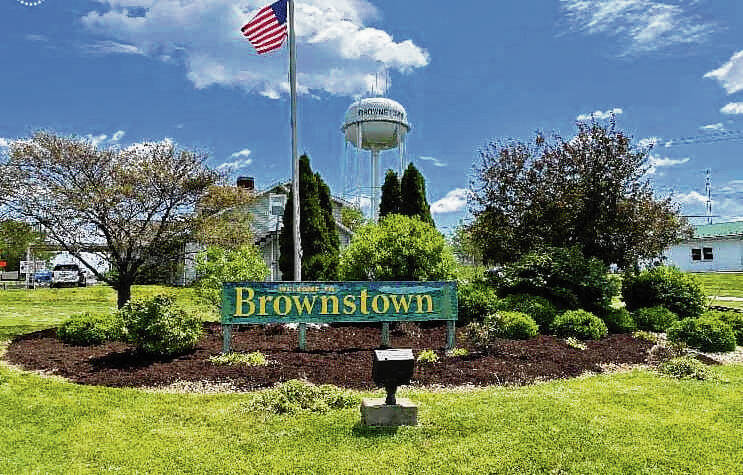
BROWNSTOWN — The Brownstown Town Council recently received information about how they can tackle stormwater runoff issues easier — and less costly — to town residents than establishing a new utility.
The council has been pursuing the possibility of putting a stormwater utility in place to deal with drainage issues around town including eight projects in particular since August of 2023.
They went as far as to pay nearly $39,000 for an Indianapolis firm, Wessler Engineering, to conduct a planning study to address stormwater issues and possibly set up a stormwater utility.
The study was paid for with contingency monies left over from a $6.5 million loan the town obtained from the State Revolving Fund to pay for improvements to the sanitary sewer system. The state required the town to use monies from that loan to address stormwater issues.
That stormwater study released earlier year has drawn concerns from some town residents because establishing the utility would cost residential users $4.98 a month initially and increase to $13 or more per month in the future as work in the eight projects, which have a price tag of nearly $14.8 million, gets underway.
The stormwater utility would have a costlier price tag for Brownstown Central Community School Corp., and businesses and industries in town.
During Monday evening’s council meeting, county Surveyor Dan Blann outlined a plan in which the council could establish a drainage district and then gave each council member a copy of the Indiana Drainage Code.
He said the code provides information about the process and steps they can take if they want to pursue establishing a drainage district. Drainage districts are funded through annual assessments of landowners in the district.
“This is so much cheaper to residents,” Blann said. “This is so much easier on the council. You are now turning this over to a qualified drainage board.”
The role of the Jackson County Drainage Department and the surveyor is to oversee regulated drains and drainages. The county drainage board and surveyor’s office — financed through the county general fund, regulates everything that goes into regulated drains and inspects, maintains and reconstructs those drains as needed. They also clean and repair storm sewers and dredge ditches.
Blann said no county in the state maintains more open miles of drains than Jackson County.
A legal drain can be a lot of things besides a ditch, he said.
“Whether it’s a tile, an open ditch, a storm drain, an easement in a subdivision, a retention pond in an industrial park,” Blann said. “All of those cans be regulated by the drainage board.”
Drainage units have been in put in place over the years in many areas of Jackson County and there are drainage units within the city of Seymour.
The rate of assessment against landowners varies from drainage unit to unit and is paid twice each year with property taxes, Blann said.
Town attorney Zach Miller asked if the money collected adequately fund projects.
“Currently we have a surplus at every one of our units,” Blann said.
He said there are times when projects have to be delayed a year or two until there enough funds can be accumulated to pay for them.
Every unit is inspected annually by Blann or one of his two employees.
Based upon those inspections and the budget, the drainage board looks at every drainage problem within each unit and prioritizes them before going out for bid, Blann said.
Then it’s a question of what work can be done with the available funds.
“We put bid packets together,” he said.
Those packets go out for bid to 15 or so local contractors.
“The only people who can compete and do these at a reasonable price are local contractors,” Blann said.
He said money raised through one drainage unit cannot be used for work in another unit.
“Our board cannot take money from Rockford and spend it in Driftwood or vice versa,” Blann said. “That’s pretty important that the taxpayers feel that the money collected goes right to use in their neighborhood.”
Assessments for drainage districts are dictated by the drainage board, but can’t be raised without a public hearing,” Blann said.
Blann said when he looks at drainage issue, he works from the problem back.
“When I drive around Brownstown, I am as aware of the local drainage problems as anybody here in this room.
“We have a group of isolated drainage problems,” he said.
Blann said the first thing he would do if Brownstown decided to adopt a drainage unit or drainage district that was maintained or overseen by the drainage board would be to look at the discharge ditches.
“How our were dispersing the water,” he said.
“If you went with this type of system in Brownstown there would have to be some structure to figure out what do we want to do,” Blann said. “What’s the problem? How do we want to use the maintenance funds? But overall it’s a much, much cheaper system.”
By not going with a stormwater utility the town will be saving money as private engineering firms would not be needed to design projects and there would not be the need to pursue state or federal grants, which always push the cost of projects much higher, Blann said. A stormwater utility also would require someone to find and address issues, he said.
He said the code book also spells out other options they council take if they don’t want to pursue drainage districts. Those include establishing a board of public works to deal with infrastructure issues such as sanitary and storm sewers and streets. Or the town could also hire a town manager.
“I’ve seen that work very, very well,” Blann said. “It only works bad if you hire the wrong person.”
